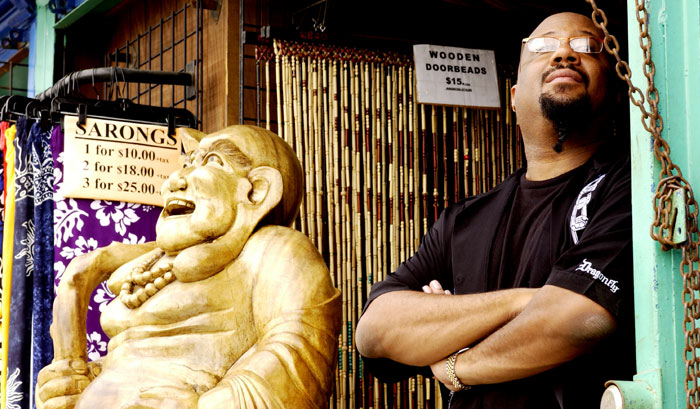


Some musicians would derive great satisfaction from doing one thing extremely well, but not keyboardist, producer, and arranger Herman Jackson. "I never wanted to be a specialist," he says. "I want to be an everyday player. I want to be able to do everything."
Judging by his wide-ranging resume, Jackson's wish has long since come true. He's worked with Stevie Wonder, Quincy Jones, Aretha Franklin, Whitney Houston, Babyface, Rod Stewart, Dave Koz, and many others. Most recently, he's served as musical director for a Nick Lachey/Jessica Simpson Christmas special and orchestra conductor for the Colors Of Christmas Extravaganza featuring Peabo Bryson, James Ingram, En Vogue, and Marilyn McCoo.
Working side-by-side with Stevie Wonder was the experience of my life.
Jackson began cultivating his dual classical/pop skills while growing up in Detroit. "There was always a piano in the house, because my mother plays," he says. "I started playing classical piano when I was seven." An early dose of Stevie Wonder broadened Herman's outlook. "I was eleven when Songs in the Key of Life came out," he remembers. "It touched on everything I'd heard up to that point: classical, soul, R&B, jazz. I spent several years trying to figure out that record, not realizing how complex it was. I just knew I liked it!"
Jackson received another infusion of Motown R&B while attending Wayne State University, where his instructors included many ex-Motown session players. By the time young Jackson embarked for LA with the band Motor City, he was practically a standard-bearer for Detroit music. Small wonder that his first big sideman gig was with Motown legend Gladys Knight. "Working for her was like going to school," says Jackson. "Obviously she's got that great voice, but she's also a consummate professional. Every night she gave 100%, even if there had been a long bus ride, or she wasn't feeling good, or whatever."
In 1993 Jackson got the call: a chance to audition with Wonder. Competing against a large pool of hopefuls, Herman got the gig.
"Working side-by-side with Stevie Wonder was the experience of my life," says Jackson. "That, too, was like going to school. Things that I thought I knew about Stevie's music, I discovered that I really didn't know at all. His attention to detail is incredible. We'd have gigs with five background singers, two keyboard players, drums, twenty string players, timpani-and Stevie could detect mistakes in one tiny part. After ten years, I still sit down with him and learn stuff. Yet Stevie is such a genuine, regular person. He's not stuck on himself-he's just wants to have fun, laugh, hang out and make music."
Jackson is quick to cite other memorable gigs. "Working with Whitney Houston and her band was definitely a highlight. James Ingram- when you're working with a voice like that, you're working with the best, and it brings out the best in you. And Quincy! We'd rehearsed a couple of times without him, because obviously he's a busy guy. These were all the great players, but when Quincy came in and started conducting, the quality went up 100%. He's the master motivator, a genius at bringing out your best."
Jackson recently released an album of original compositions entitled Magic Touch. "The biggest challenge," he says, "was making it into a cohesive piece of work, because these were songs I'd started at different points in my life, working with different people. But I invited some of my best musician friends, and they showed up and gave their all, and it was beautiful. I'm happy with it-though as soon as it was finished, I started thinking about the next project."
Over the years Jackson has relied on such Yamaha keyboards as DX7, P200, and Motif. And nowadays he develops his ideas on a PSR3000 workstation. "I use it for songwriting and arranging," he explains. "Having all those beats and styles frees me to concentrate on the creative process. I don't have to worry about sounds, because they're all right there. With the PSR3000, I can focus on being creative, as opposed to programming drums, finding bass sounds, and dealing with all those things that can take you away from the writing and arranging process. The PSR is very easy to learn-I don't think I've read the manual yet! I just turn it on and play. I don't want to spend my time reading manuals, that's for sure!"
For all Jackson's talent, he argues that success in music often hinges on extra-musical skills. "You need good communication skills, and you have to be able to get along with people. You need to be professional and punctual. You can be the greatest player in the world, but if nobody wants to be around you, they're not going to call you!"
























